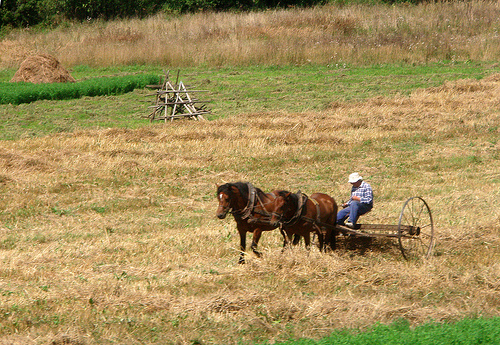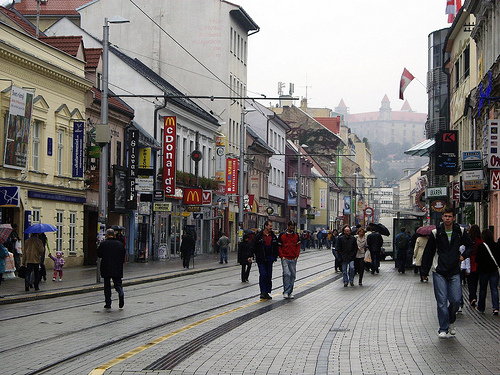Learning the Social Customs of Slovakia

Slovakia is traditionally a rural culture, descending from people who settled around the Danube River basin around the 6th and 7th centuries. Though there was some industrialization took place under the Soviet regime, it still remains mostly a farming country with some modern regions. Bratislava is the largest Slovak city, with a population around 429,000.
Their language, called Slovakian or Slovak, is a Slavic language that is very similar to Czech, though it has some fundamental spelling differences. Few people speak English as a second language in Slovakia, especially in rural areas; German is more common. There is definitely a rivalry that exists between Slovaks and Czechs. Much of the Slovak history is written to reflect oppression, first from the Soviets and then from the Czechs. These two countries broke apart peacefully in 1989, during the Velvet Revolution, ending the old nation, Czechoslovakia.
Slovaks are very tied to their families and see them as the basis of their social structures. This is especially apparent in rural areas. Other than the family, Slovaks tend to be private people, and can come off stand-offish and not open to strangers. This tends to change once they begin to know others better, but that takes time.
A large part of Slovak culture is the spa. Slovakia generally has a cold, wet climate, so people choose to escape through the many natural hot springs. There are also deposits of peat and mineral-rich mud. These materials have folk remedies, being used for generations to cure ailments.

The Slovaks tend to be quiet and reserved. Greetings are warm, but they probably are not overly emotional or personal. People will probably expect a handshake, eye contact and greeting for the appropriate time of day. “Dobre rano” means “good morning”; “dobre popoludne” means “good afternoon”; “dobru noc” means “good evening.” Do not use someone’s first name until invited; instead, say “Pan” (Mr.), or “Pani” (Mrs.), followed by the last name.
If you are invited to a Slovak home, it is appropriate to bring a gift, such as flowers, wine or chocolate. Flowers should be in odd numbers, just not 13; refrain from giving chrysanthemums or white lilies, which are used for funerals.
If a Slovak invites you out to be entertained, it will probably take place in a pub, restaurant or wine bar. Homes are generally considered private. Nevertheless, you may be invited to a home, in which you should arrive on time, and take off your shoes at the door. You should dress well, and do not bring up business or professional matters. At the dinner table, make sure you wait for the host to initiate the meal by saying “do brou chut.” Do not put your napkin on your lap, but keep it folded next to your plate. Toasts will probably occur a few times during the meal, as the culture is not shy of alcohol. The most common way to toast is to say “naz dravie,” meaning “to your health.”

Some amendmend, Slovakia split up with Czech rep. in january 1993, not 1989.
Historical oppression was not so much from Czechs, but mainly from Hungary in period of 1867-1918. There were more attempts to grab southern part of Slovakia even throughout 20th century. This is why many Slovakians (with exeption of young generation) see Hungarians as enemies.
It it noteworthy to say that in southern Slovakia relationships between Slovaks and Hungarians are more harmonious than it may look from the media.
Slovakians are quite reserved, thats right, and not used to foreigners and they fear of multi-culti thing.
when I read this as Slovak national I have to agree with some terms, even being surprised when somebody writes something about Soviet regime, when there had not been ever any. It just shows a lack of education in history terms, or such western thinking – what was behind the bars before 1989 is just former Soviet Union. I have to agree Slovaks are reserved and warmed up quickly, depends of behaviour of foreigners, it is especially caused by terms, that Slovak society does not need such being too cosmopolitan like rest of Europe, because when you travel some 60 km to Vienna, Austria, then you see why. Loads of immigrants from all over the world, that is why Slovaks are reserved, they just don’t like the whole Asia and Middle East to be included in the society, and then the safety of local inhabitants is not so nice, this is why comparing with Vienna. You take a bus or subway train in Vienna in late night, you must be scared of getting on after 10 pm, this is what you are not going to experience in Slovakia, talking especially about the Capital of Bratislava. 🙂
Having been married to a Slovak girl for 14 years, living/working in Slovakia for the past 7 years and having 2 children here in Slovakia I can say that I have extensive experience and knowledge of Slovak both culture and mentality, also from a foreigners point of view that most of the above article is indeed accurate.
Slovaks can be cold until they know you, after which they are very friendly, helpful & loyal to you, the same is rightly expected in return. This is what keeps Slovak people close and strong.
Over the past 15 years one sad thing has happened and that is that a number of Slovaks (not all though) have become very materialistic, greedy and jealous of each other as some have become successful post ‘iron-curtain’ while others have struggled (mainly those over the age of 40) with the concept of capitalism. Please do not let that put you off either visiting or doing business here in Slovakia as I am referring to a minority.
With respect to the ‘problem’ of the ethnic Hungarins living in the south of Slovakia I can only sympathise with the Slovaks who have had to endure the unwanted oppression of the Austro-Hungarian Empire for so long. The tensions today often refer to the fact that nearly all the ethnic Hungarins will only speak Hungarian, teach it in Slovak schools, have shop signs, business names in Hungarian and also refuse to accept Slovak culture in any form but still want all the benefits of being a Slovak citizen! As a British national by birth I understand this Slovak anger as my own homeland has become unrecognisable & its culture destroyed due to the ridiculous influx of Asians, Africans, Arabs & West Indians since the end of World War II.
On a more happy note I would like to wish my fellow Slovaks lots of luck in the 2011 Ice Hockey World Championships being held right here in the beautiful Slovak cities of Bratislava & Kosice.
DO TOHO SLOVENSKO!!!